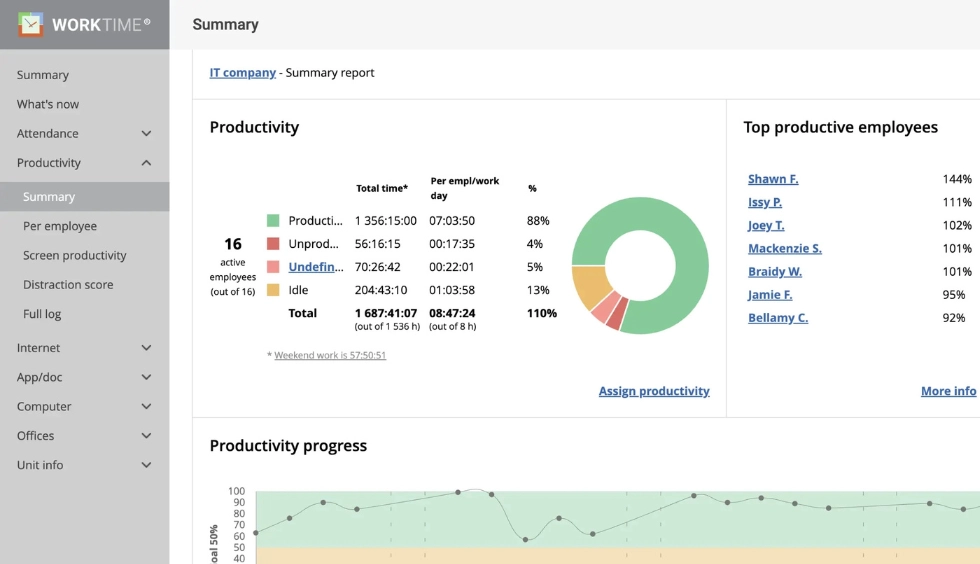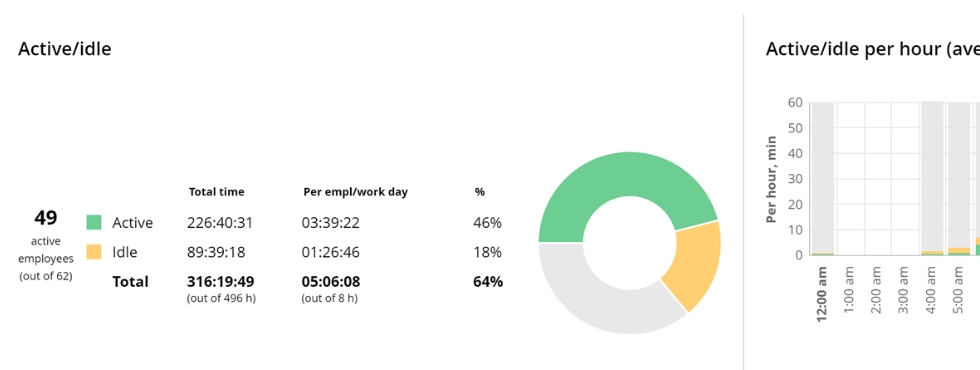Position of India on the global salary chart
The Economic Times reports that India placed 72nd on a global list with an average salary of INR 32,800 ($329) per month. Still, with a sharp increase in 2022 of 10.6%, the rate of the average salary in India is constantly changing. It is predicted that the average income in India will continue to grow in 2024. The highest salary increase is expected in the manufacturing and service business.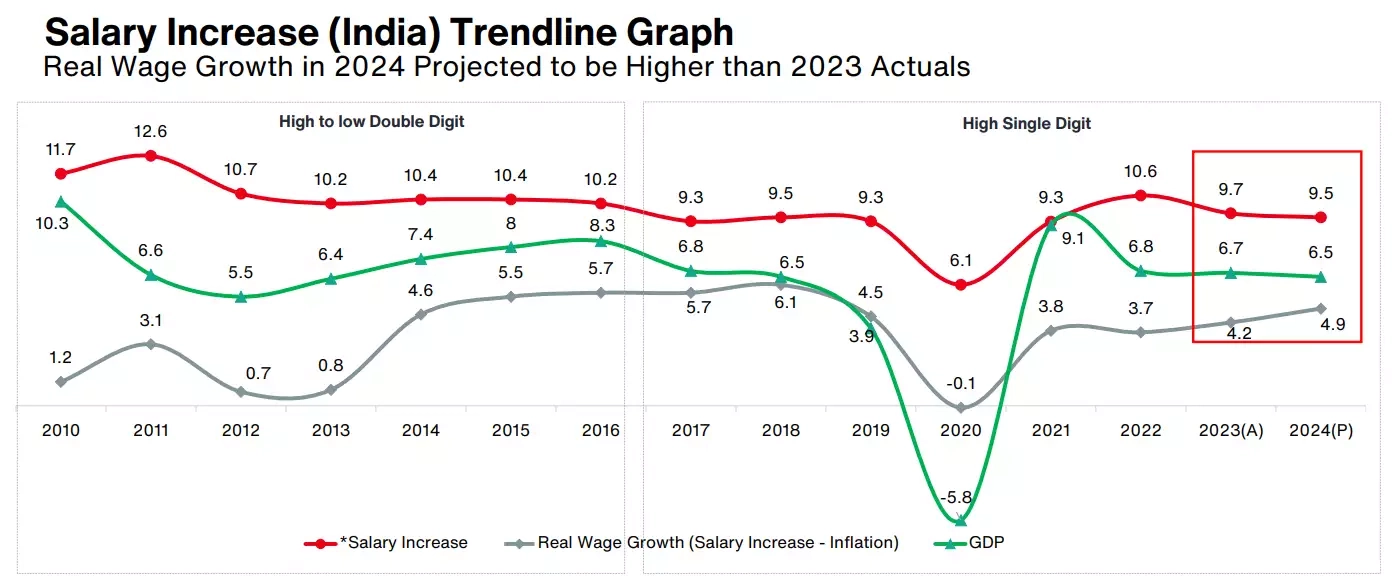
Source: The Economic Times
Labor laws in India
India has a complex employment law system. Many factors must be considered if you are going to hire employees or outsource to India. State governments, business size, and industry are the core aspects affecting employment regulations and policies. So, what should you keep in mind? Here is a short list:- The Indian government recently consolidated the federal labor laws, codifying them into 4 codes. It resulted in less number of regulations but 20 times stricter penalties for noncompliance;
- Employees are divided into two main types: workmen (non-managerial employees) and non-workmen (managerial employees). Working conditions, the average salary in India, and regulations differ depending on the employee type.
- Misclassifying employees leads to serious outcomes, including penalties;
- The Constitution protects employees against discrimination related to religion or sex;
- According to the Trade Unions Act, Indian employees have the right to form trade unions to deal with workplace disputes, negotiate conditions, and hold demonstrations;
- The Occupational Safety, Health and Working Conditions Code obliges employers to ensure workplace health and safety standards;
- Data privacy rules require safeguarding employees’ personal information.
What industry does India heavily rely on?
The agriculture sector has been the predominant one for many years. Even after a decline in 2022, it remains the primary source of income and revenue. Then comes industrial production, including the petrochemical industry, pharmaceuticals, and mining. The service industry has been taking the leading positions during the last few decades. Telecommunications, software, and IT are among the dominant service industries in India. Business process outsourcing (BPO) is no less significant, as it has been the top-growing Indian industry since the 1990s.Average salary in India and its impact on outsourcing
What is the average salary in India? It depends on many factors. Usually, the average income in India depends on the sphere, location, age, and experience. According to Forbes, the average wage of India is INR 9,45,489 ($11,330) a year. Thus, India's minimum wage is about INR 8,000 ($96), while India's highly-paid jobs wage rate is INR 1,43,000 ($1,714) monthly.Average salary by age in India
Age is another criterion affecting the average salary of a person in India. Here is a short overview of salaries in India by Paylab:
Source: Forbes
In USD equivalent, the average salary by age in India ranges from $70.64 to $164.80 per month.Highly paid jobs: average salary in India
The median income in India also depends on the employee’s experience and location. Thus, the average wage in Mumbai (the financial capital) and Bengaluru (the startup capital of India) is higher than in other cities. *Note that lakh is the Indian equivalent of one hundred thousand (100,000).- Junior-level specialists' average salary in India per year ranges from INR 5.47 lakh ($6,546) to INR 6.71 lakh ($8,030).
- Annually, the mid-level average salary of a software engineer in India starts at INR 14.43 lakh ($17,269) and can reach INR 18.06 lakh ($21,613).
- Senior-level specialists: for example, the average salary of a CEO in India ranges from INR 28.61 lakh ($34,245) to INR 36.68 lakh ($43,405) annually.
The cost of living in India
The cost of living depends on the city. Regarding the Statista, Noida was the most expensive city in India to live in 2023. Mumbai, Hyderabad, New Delhi, and Bengaluru are among these cities. The cheapest cities are Kolkata, Kochi, Indore, and Coimbatore.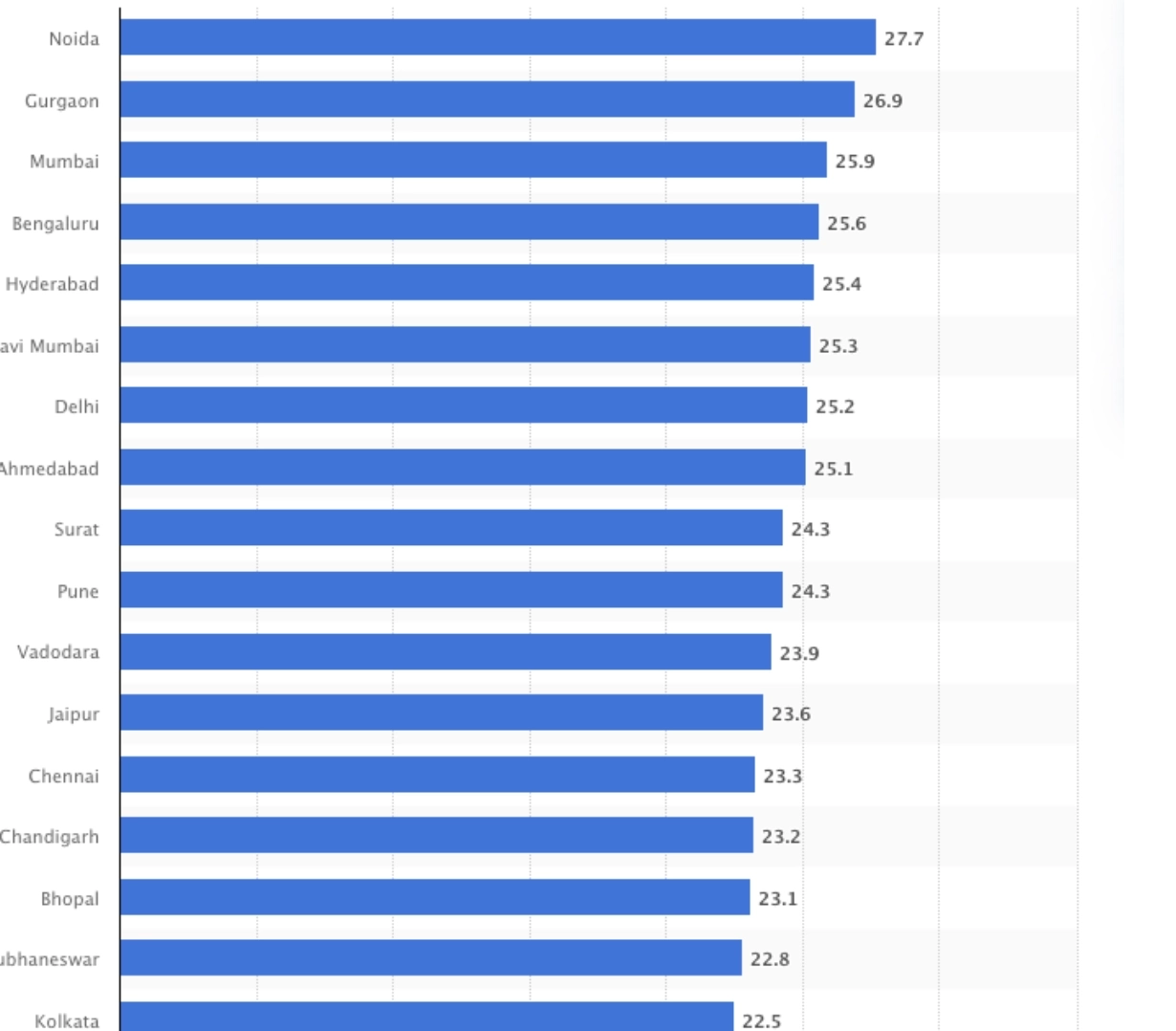
Source: Statista
The average monthly cost of living in India with rent is INR 60,697 ($727) for a single person and INR 140,635 ($1,685) for a family of four. Of course, the numbers differ depending on the city.Where does India outsource to?
For several decades, India has been the favorite destination for outsourcing services. The United States and the United Kingdom are the leading markets for outsourcing to India. Moreover, other English-speaking countries tend to choose India. Recently, the geography of countries outsourcing services to India has been expanded. Some Asian countries, including Japan and Singapore, found India a profitable destination for outsourcing.Which country outsources the most to India?
The United States is the leading market that is outsourcing to India. It takes 62% of Indian IT outsourcing. The United Kingdom follows the US, importing 17% of Indian outsourced services.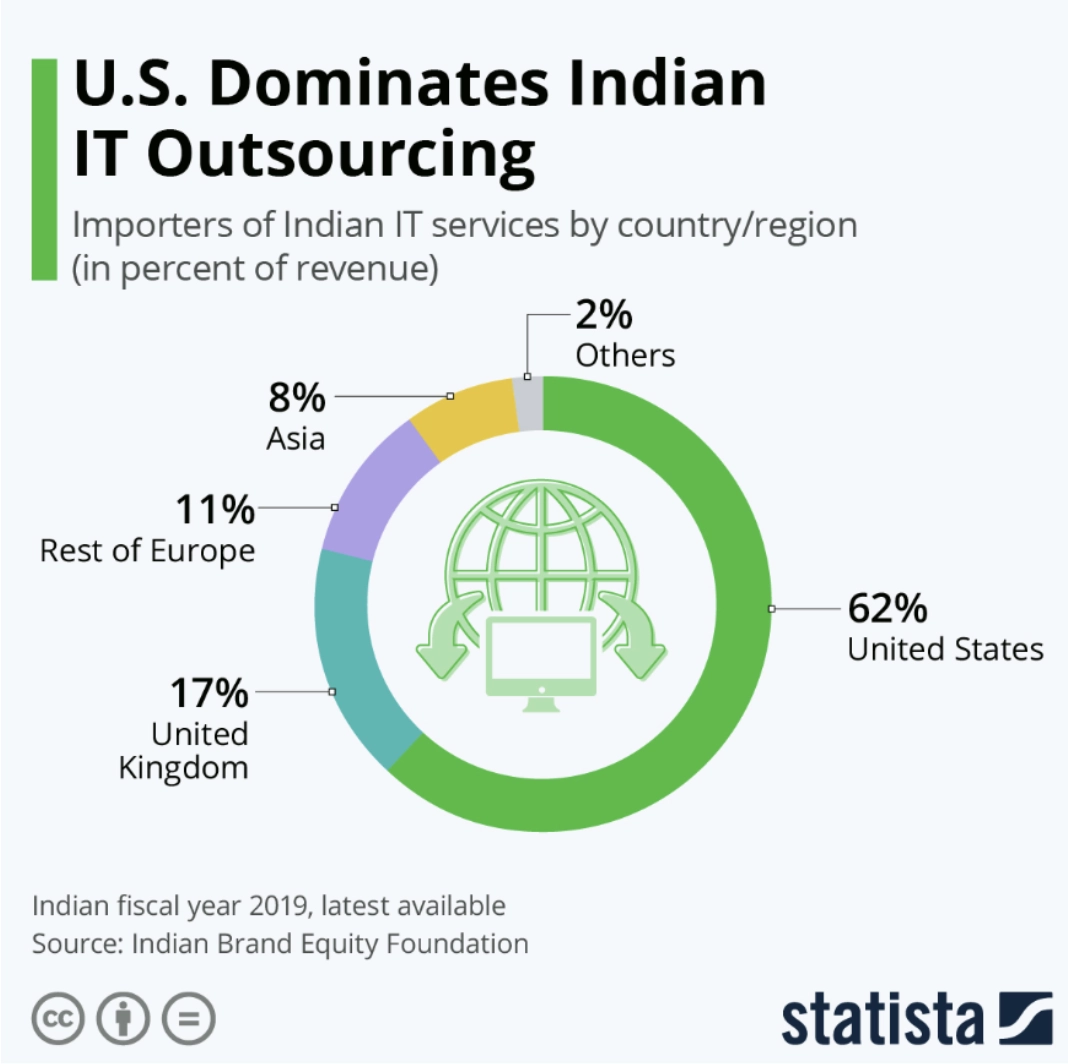
Source: Statista
India—the outsourcing giant in the world
India has the largest pool of talented people who drive business into the country. Here are the numbers that prove India is the best outsourcing destination in the world: India's IT outsourcing market was valued at $585.57 billion in 2023. Such world-known giants as Microsoft, Ford Motors, American Express, Dell, Hewlett Packard (HP), IBM, Google, and Amazon are among the companies that outsource to India. CISCO is also leading the list of companies outsourcing software development to India.The father of BPO in India
Raman Roy is known as the father of BPO, having set up the first outsourcing firms for American Express and General Electric. Raman Roy also established and co-founded several BPO companies for different industries:- GE Capital’s operations (mid-1990s);
- Spectramind (est. 2000);
- Wipro (est. 2002), Indian IT services company
- Quatrro Global Services (est. 2006) offers finance and accounting outsourcing, technical support, and customer services.
The first outsourcing company in India
The history of global outsourcing to India started in the 1990s with the emergence of business process outsourcing (BPO). General Electric is known as the first company to start outsourcing software development to India.What are the big 4 BPO companies in India?
India is now a global outsourcing leader and a frontrunner in business process operations (BPO). The Indian BPO industry costs $40 billion and is expected to grow in the coming years. The most popular industries for outsourcing to India include IT and software development, customer support services, technical support, and IT help desk. Among the top Indian BPO companies are: 1. Genpact (AI software tools, Data Analytics, Customer Care, Finance and Accounting, and Supply Chain Management); 2. Infosys BPM (Business Transformation, Legal Services, Master Data Management, Customer Care Solutions); 3. Wipro (Cloud Computing, Cybersecurity, Data Analytics, AI solutions); 4. Tata Consultancy Services (Data and Analytics, Cybersecurity, Cloud Solutions, Consultancy Services).BPO regulations in India
Indian employment and labor legislation is quite complicated due to a variety of laws, regulations, and policies related to norms of normal salary in India, working hours compliance, tax regulations, and employee benefits. Outsourcing to India includes an extensive range of legal considerations and regulations the employer should consider: 1. Employment laws and regulations; 2. Taxes; 3. Insurance; 4. Customer policies; 5. Data protection; 6. Dispute resolutions; 7. Outsourcing terms; 8. Liabilities; 9. Contract termination; 10. Asset transfer and exchange.What makes India the top outsourcing destination?
Several reasons that make outsourcing to India profitable:- Qualified employees. India has a large talent pool with experience in software development, project management, and other industries. Indian employees are known worldwide as skilled, reliable, and cost-effective service providers.
- Governmental support. The government of India invests money in the development of IT and telecommunications;
- Diverse outsourcing industry. India provides outsourcing services in many fields, including human resources, finance, accounting, customer support, software development, cybersecurity, AI tool solutions, and more.
- No language barriers. English language proficiency is a key to successful communication, making India an attractive destination for outsourcing;
- Flexible pricing options. The average salary in India is significantly lower than in the US or UK, which is good for cost-saving.
What are the problems with outsourcing to India?
Here are some pitfalls of outsourcing to India:- Cultural differences can lead to possible miscommunication between employers and employees or between employees and customers.
- Time zone. Due to a large difference in time, the employees are not able to respond to urgent requests.
- Monitoring productivity. It’s hard to evaluate the outsourced staff. But with WorkTime, you will easily assess the productivity and engagement of your outsourced employees.
- Data security risks. It’s important to negotiate the NDA and request ISO certifications while choosing the provider to outsource to India.
What is the current state of outsourcing in India?
Currently, India is a global BPO provider, making it one of the most profitable countries for outsourcing. What’s more, the Indian IT sector is expected to increase its annual revenue to $300-350 billion by 2025. Hence, outsourcing to India will still be profitable and attractive for many countries in the next couple of years.Top 10 outsourcing cities in India
These are the most common outsourcing destinations in India: 1. Bangalore; 2. Mumbai; 3. Delhi; 4. Chennai; 5. Pune; 6. Hyderabad; 7. Coimbatore; 8. Kolkata; 9. Chandigarh; 10. Jaipur.India vs. Philippines
The Philippines is the main outsourcing competitor of India. Each country has its strengths. For instance, India is known for IT and software development, while the Philippines can offer expertise in customer service and back-office support. So, you need to consider all factors to choose the best-fitting and profitable outsourcing destination for your business.Employee monitoring in India
Employee monitoring is legal in India, intending to improve productivity and develop self-discipline. According to the Information Technology Act of 2000, monitoring can only be implemented with genuine business objectives. Moreover, it should not invade the employee’s privacy. Finally, the employer should notify the employees that they are being monitored. Besides, the employer should get written consent and include employee monitoring in privacy policies, employee handbooks, or employment agreements.Employee monitoring makes outsourcing more attractive
Employee monitoring makes outsourced team management easy and effective. WorkTime evaluates productivity, attendance, active/idle time, Internet use, distraction score, and more. And as a result, you get 50+ non-invasive reports with comprehensive statistics on your employees' performance. Benefit from outsourced team monitoring with WorkTime: 1. Multi-office monitoring. You can monitor your in-office and outsourced employees and compare their performance. Add different offices and get detailed reports on productivity, active time, and attendance per office.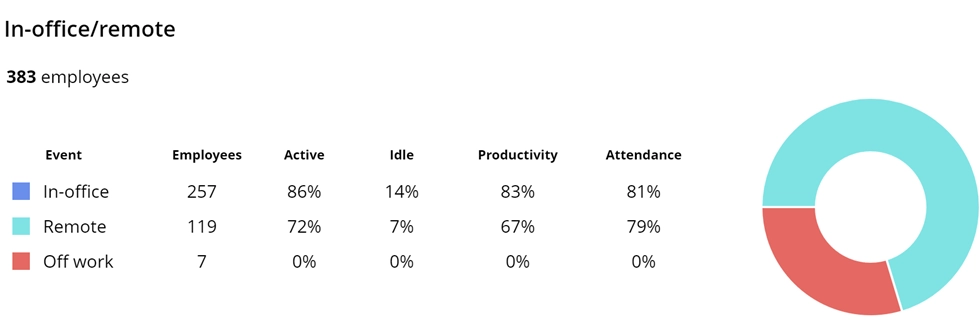

WorkTime monitors and compares employee performance across multiple locations, making it easy to assess attendance, active time, and productivity without relying on assumptions.
Book demo